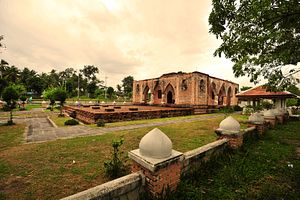There are recurring fears of a jihadist threat in Southern Thailand. Although Thailand suffers from a long-running insurgency in the deep south, the issue has often been branded as a ethno-nationalist struggle rather than as part of global jihad. However, with a series of ISIS-linked activities in Southeast Asia, compounded by returning ISIS fighters from the Middle East, there are renewed concerns about jihadist elements taking advantage of the existing vulnerability in Southern Thailand. This examination of those fears draws from International Crisis Group’s November 2017 report Jihadism in Southern Thailand: A Phantom Menace.
The jihadist elements might not be focusing on fighting the Thai state, but could be concentrating on neighboring Malaysia. There is a historical precedent from back in the Cold War when the Communist Party of Malaya (CPM) took refuge in Southern Thailand but planned for attacks targeting Malaysia. There are fears that returning ISIS fighters could take the same approach. Nevertheless, these fears remain unfounded as the ethno-nationalist character of the conflict is strong enough to withstand jihadist influence.
Background
The insurgency in Southern Thailand remains a localized conflict over territory and identity, rather than one staged as part of the global jihad. The narrative of the Southern Thailand insurgents conjures up historical memories of the Sultanate of Patani in mythical proportions. The Sultanate of Patani was claimed to be a trading hub and a center for excellence in Islamic studies before the painful subversion by Siamese colonization. By incorporating the Malay Sultanate into Siam, it meant not only the end of national sovereignty but also the Malay identity.
As it can be seen, the narrative bears a strong ethno-nationalist character and there is no mention of a fight in the name of global jihad. The role of Islam in the narrative pertains only to an image of Patani as a sacred Islamic land that has fallen under the rule of the “non-believer.” The struggle is to free Patani from Thai rule rather than defending the worldwide Muslim community and liberating all Muslim lands.
Religious leaders in Southern Thailand also rejects the Salafi-jihadist ideology espoused by groups such as ISIS and al-Qaeda. Rather, Malay Muslims there adhere to traditional forms of Sunni Islam of the Shafi’i school. Therefore, this misalignment in the religious interpretation between the transnational terrorist groups and the Malay Muslims there serves as an obstacle to jihadist influence.
The insurgent leaders are also not prepared to work with these transnational jihadists. Jemaah Islamiyah had previously tried to work with the Southern Thailand insurgents but failed to gain traction. More recently, the main insurgent group, Barisan Revolusi Nasional (BRN), has made it clear that ISIS is not welcome in the deep south.
At this moment, the insurgents’ priority is to gain legitimacy, particularly from the international community, for their separatist cause. By working with jihadist groups, any form of legitimacy the insurgents had would be gone. As such, it is not conceivable that the insurgents would take that risk.
Future Trajectory
That said, there are some factors that might have a significant impact on the current status quo of non-jihadist influence. First, there is still a possibility that young Malay Muslims could fall prey to jihadist ideology via social media, although there is no concrete evidence yet to prove such a trend in the deep south. But in the information age, it is hard to have a monopoly over the information consumed by the Malay Muslims there.
In other words, self-radicalization can likely happen among the youth, particularly when Malay Muslims in the deep south lack sufficient knowledge about ISIS. This is a result of local intellectuals and academics failing to discuss ISIS publicly, out of fear and reluctance. They fear that authorities might associate them with ISIS if they talked about it openly. Some imams also tend to minimize any discussion of jihadism.
The Malay Muslim populace’s ignorance about ISIS and its ideology should be a concern for the authorities. Representatives of BRN’s Information Department have already voiced concerns that it is possible for young Malay Muslims to be influenced by online jihadist propaganda in part because of this lack of knowledge. Hence, this is an area which can change the status quo very quickly.
Second, it is also plausible that splinter groups could emerge and these groups may find advantages in aligning with the jihadists. Stalemate in the current peace dialogue could result in some disgruntled followers of the BRN splintering off to join forces with the jihadists.
To date, that prospect is still highly unlikely. Even if terrorist tactics are adopted, the aims of the Malay Muslim insurgents remain narrowly focused on Patani-nationalist goals rather than global jihadist ones. But since nothing has been achieved in alleviating the current plight, there is still a small possibility of the jihadist ideology gaining greater traction among younger Malay Muslim insurgents.
Overall, the deep south of Thailand has been able to withstand jihadist influence, but the current status quo can change. The only way to manage possible jihadist influence is to work on the current peace dialogue in Southern Thailand.
Ending the conflict should be a priority. The Thai military government must take serious effort to hold discussions with the main insurgent group, BRN and accept that a decentralized political order that respects Malay Muslim identity while protecting the rights of local Buddhists remains the best solution.
Eugene Mark is a Senior Analyst with the S. Rajaratnam School of International Studies (RSIS) in Singapore.

































